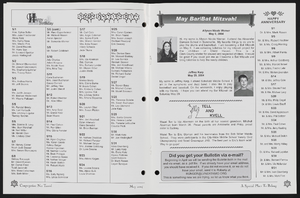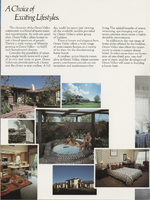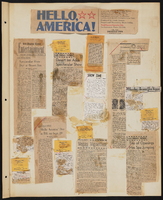Search the Special Collections and Archives Portal
Search Results

Ashley E. Nitz oral history interview: transcript
Date
Archival Collection
Description
Oral history interview with Ashley Nitz conducted by Claytee D. White on February 6, 2018 for the Remembering 1 October Oral History Project. In this interview, Ashley Nitz discusses her experiences attending the 2017 Route 91 Harvest music festival in Las Vegas, Nevada with a friend. She talks about making the weekend of the event a "staycation", where she stayed with her friend at the Trump Hotel. Nitz goes into detail on the Route 91 Harvest festival venue and the events of that Sunday night when the shooting began. She speaks of the lockdown in the Tropicana Hotel and the support given there to all of the survivors, such as water and medical aid, as well as her journey home once the lockdown was lifted. The interview ends with a discussion on life after the shooting.
Text
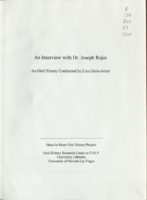
Transcript of interview with Dr. Joseph Rojas by Lisa Gioia-Acres, September 30, 2008
Date
Archival Collection
Description
Dr. Joseph Rojas, born 1933 in Alexandria, Louisiana, was the son of Joseph Edward Rojas and wife Carroll. He graduated high school at age 16 and entered Loyola University of the South. Two years later he was accepted at Louisiana State University School of Medicine, graduating with a medical degree in 1957. He interned at Charity Hospital and then completed his OB-GYN residency at Tulane University. Several mentors worked with Dr. Rojas during his residency and he recalls learning surgical and bed-side skills from the likes of Dr. Lynn White and Dr. Fred Janson. He also remembers the very high volume of patients - up to 300 - that he and other residents saw daily. Dr. Rojas married Mona Robicheaux, RN, during his residency and afterwards joined the Air Force. He and his family — they eventually had six children — were stationed at Nellis Air Force Base, arriving in Las Vegas in 1961. He was chief of OBGYN and deputy hospital commander while at Nellis and then served as chief of OBGYN at Southern Nevada Memorial Hospital until 1972. He later served as chief of staff at Women's Hospital and Valley Hospital, and was the first chief of staff at Summerlin Hospital. Dr. Rojas also maintained a private practice outside of the hospital. His wife worked alongside him in his office, and they share memories and anecdotes of the patients they saw and the general atmosphere of the medical community. Both Joseph and Mona agree that Las Vegas hospitals were less racially segregated than the hospitals in Louisiana, and felt that the West was more open to integration. In 1966 Dr. Rojas started the first OB-GYN residency in Nevada, which led to the development of the University of Nevada School of Medicine. He was a researcher, lecturer, teacher, and author. He earned many awards, including the Harold Feikes MD Award for Outstanding Physician in Clark County (2001), and the Nevada State Medical Association Distinguished Physician Award (1980). Dr. Rojas passed away in May of 2009, leaving behind an incredible legacy of service to the residents of Clark County.
Text
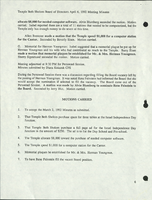
Minutes from Temple Beth Sholom Board of Directors meetings, April 1992 - August 1992
Date
Archival Collection
Description
Meeting minutes include reports from committees of the board, correspondence, and balance sheets.
Text

Photographs of Desert Moon Motel sign, Las Vegas (Nev.), April 18, 2017
Date
Archival Collection
Description
Site name: Desert Moon Motel (Las Vegas, Nev.)
Site address: 1701 Fremont St
Sign owner: Jerzy and Celina Kosla
Sign details: The building was constructed in 1942 (Assessor). According to one commentator, the Desert Moon motel opened on the site in 1952 (Roadside Architecture.com). The cars on a vintage postcard of the motel appear to date from the late 1940's or early 1950's (Ebay). The same vintage postcard (Ebay) shows the motel as a member of United Motor Courts, an early motel referral chain founded in 1933 which published a travel guide until the early 1950's (Wikipedia). Based in Santa Barbara, California, United Motor Courts was made up of "a friendly group of independent owners of motor lodges..." (Historic Highways). The Quality Inn motel franchise was a spinoff of United Motor Courts (Wikipedia). The motel has been renovated by its current owner, Polish immigrant George (Jerzy) Kosla (Glionna, 2017).
Sign condition: The sign is Condition 4, good. The paint appears slightly faded but there is no flaking or peeling. The cabinets, reader boards, and fiberglass moon are all in good condition. The neon is intact.
Sign form: Pole sign
Sign-specific description: The sign pole and metal cabinets are painted pink. The design and lettering are the same on both sides of the sign. The trapezoid-shaped lower cabinet extends horizontally toward the street. It contains a rectangular white plastic lightbox which states "FREE ADULT MOVIES" in red sans serif letters and "FLAT SCREEN TV'S in smaller black san serif letters. To the left of the letters is the black silhouette of a female figure. On the metal below the plastic screen are clear sans serif neon letters which spell out, "NO VACANCY" in red when illuminated. The upper metal cabinet hangs from the street side of the pole. White painted san serif letters, covered by clear sans serif neon letters which glow red when illuminated, run vertically down the cabinet to spell out, "XXX MOVIES". Five metal cabinets attached to the street side of the sign run vertically to spell out, "M-O- T-E- L" in white painted sans serif letters covered by yellow sans serif neon letters. On top of the pole is a white p
Sign - type of display: Neon, Lightbox
Sign - media: Steel, Plastic, Fiberglass
Sign - non-neon treatments: Lightbox
Sign environment: East Fremont Street, surrounded by other motels.
Sign - date of installation: c. 1950s
Sign - date of redesign/move: The now pink or faded red sign cabinets were painted blue in a 2003 photograph
Sign - thematic influences: Desert, Space Age, Western
Sign - artistic significance: The current sign appears to have taken the Western/Lunar theme from the previous sign and transformed it into a 1950's/1960's Space Age/Lunar theme
Survey - research locations: Assessor's website
Survey - research notes: Ebay. Las Vegas NV Desert Moon Motel roadside Nevada vintage linen postcard ca 1940s. Retrieved from https://picclick.com/LAS-VEGAS- NV-Desert- Moon-Motel- Roadside-Nevada- 141923576051.html Glionna, J. M. (2017 April 23). Motel, once a haven, now a crime-ridden jungle in downtown Las Vegas. Las Vegas Review Journal. Retrieved https://www.reviewjournal.com/local/local-las- vegas/downtown/motel-once- a-haven- now-a- crime-ridden- jungle-in- downtown-las- vegas/ Historic Highways. (2007 July 14). Archive for the "Motel Associations" category: Looking for a motel in 1933. Retrieved from https://historichighways.wordpress.com/category/motel-associations/ Roadside Architecture. com (n.d.). Las Vegas Signs: Desert Moon Motel. Retrieved from http://www.roadarch.com/signs/nvvegas.html RoadsidPeek.com. (n.d.). Downtown motels Las Vegas: Desert Moon Motel. Retrieved from http://www.roadsidepeek.com/roadusa/southwest/nevada/vegas/lvmotel/lvdownmotel/index5.htm Wikipedia. (n.d.). Motel: 2.6 R
Survey - other remarks: A postcard circa early 1950's features a different sign with a saguaro cactus and quarter moon (Ebay). The current sign appears to have taken the Western/Lunar theme from the previous sign and transformed it into a Space Age/Lunar theme, which may indicate that the sign dates from the date from the late 1950's or 1960's.
Surveyor: Mitchell Cohen
Survey - date completed: 2017-08-22
Sign keywords: Neon; Steel; Plastic; Fiberglass; Pole sign; Light box; Sculptural
Mixed Content
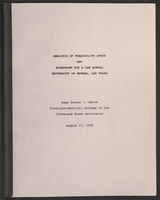
University of Nevada, Las Vegas law school feasibility studies
Date
Archival Collection
Description
Folder contains a study titled "Analysis of Feasibility Study and Blueprint for a Law School, University of Nevada, Las Vegas" by Steven R. Smith, Cleveland-Marshall College of Law, Cleveland State University, August 17,1990 and a second study titled "A Feasibility Study for a Law School at the University of Nevada, Las Vegas" prepared by R. Keith Schwer, PhD, Director, The Center for Business and Economic Research, University of Nevada, Las Vegas, May 29, 1996. From the University of Nevada, Las Vegas William S. Boyd School of Law Records (UA-00048).
Text

Interview with Marie Elizabeth (Stever; Daly) McMillan, March 5, 2004
Date
Archival Collection
Description
Text
Marie and James B. McMillan Papers
Identifier
Abstract
The Marie and James B. McMillan Papers (1928-2010) primarily contain documents pertaining to the families and careers of Marie and James B. McMillan. Included in the collection are photographs, biographical materials, newspaper clippings, award certificates, programs, obituaries, scrapbooks, trophies, legal and military documents, and political campaign documents. Marie McMillan is a former Las Vegas, Nevada flight instructor and one of the first women to work at the Nevada Test Site in Nye County, Nevada. James B. McMillan was the first African-American dentist to practice in Nevada, as well as a prominent Nevada civil rights leader.
Archival Collection

